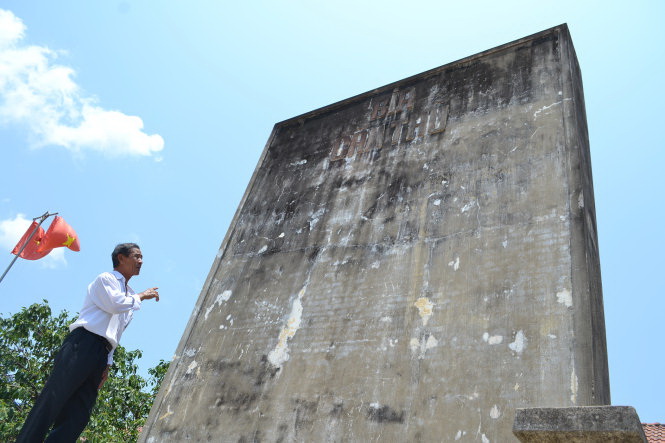Survivors and families of those killed in the massacre of Vietnamese civilians by South Korean mercenaries half a century ago plead for memorials to be erected in their honor.
>> Vietnamese survivors of S.Korean massacres – P3: Separated sisters
>> Vietnamese survivors of S.Korean massacres – P2: Tragic plights
>> Vietnamese survivors of S.Korean massacre – P1: Lifelong pains
In Hoa Hiep Nam Commune, Dong Hoa District, located in the south-central province of Phu Yen, stands a towering monument, the front of which bears only three words ‘Bia Cam Thu’ (Stele of Hatred).
According to Le Thanh Hoa, chair of the Hoa Hiep Nam People’s Committee from 1982 to1995, the memorial was built by the administration of the former Phu Khanh Province two or three years after the nation was unified, in April 1975.
The province has since been divided into Phu Yen and Khanh Hoa Provinces.
The monument originally featured a brief summary of the massacres that occurred in several of the commune's hamlets, along with the civilian death toll in each tragedy.
The commune’s administration chose a busy intersection, rather than the site of the massacres that saw the slaughter of innocent lives, to give a more frequent reminder to passers-by of the tragic incident.
Nguyen Ky Tuan, 56, a witness to the killing of 37 residents in Phu Lac Hamlet in early 1966, observed that the cenotaph is quite old now, and the enmity-inducing words are no longer appropriate in today’s world.
“We, local residents, really hope another memorial will be built at the actual site of the victims’ death,” he said.
Pham Dung, a witty 88-year-old man who served on the commune’s police force at the time of the massacre, was overwhelmed with gloom while recounting the Go E-Gop Det slaughter committed by South Korean troops in the commune.
Completely blind in one eye, Dung’s other eye smoldered with gloom at the thought of his 13-year-old daughter, one of the slain victims.
The old man is left pondering why the provincial and district administrations have yet to build a monument to honor his deceased father, daughter, and all those who perished in the massacre.
Doan Nghia is another survivor of the tragedy.
One of only nine children who survived the slaughter in Binh Hoa Commune, Binh Son District, located in the central province of Quang Ngai, Nghia is now known throughout his neighborhood as a blind singer.

Graves near Ganh Ca Beach are the resting place for innocent massacre victims. Photo: Tuoi Tre
He was only six months old when the catastrophe hit his hamlet.
The infant made it out alive, but suffered wounds on his thighs and bottom, along with the complete loss of vision in both eyes.
He is now happily married with a son and daughter named Binh and Yen, which together mean “Peace.”
His 56-year-old elder brother, Doan Nhan, age six at the time of the mass killings, also survived with head injuries.
Nhan and Nghia have advocated for a road to be built leading to the massacre memorial zone and for the memorial shrine to be renovated.
According to Nguyen Thi Bich Dao, deputy head of the Cultural Heritage Department under the Phu Yen Department of Culture, Sports and Tourism, the area making up Phu Yen Province alone went through 22 massacres carried out by South Korean mercenaries.
At least 925 innocent locals were killed.
The department proposed to the provincial People’s Committee in 2011 and 2013 that it recognize the massacres in Tuy An District as provincial cultural relics.
Dao added that the agency will consider granting the same recognition to other massacre sites in coming years, but for now, the memorial in Phu Lac Hamlet remains the province’s only monument in honor of the deceased. Nguyen Van Dong, deputy director of Phu Yen Province’s Department of Construction, survived the massacres that left his mother and younger sibling slaughtered at the hands of South Korean troops in Hoa My Commune, Dong Hoa District during Tet (Lunar New Year) in 1966.
Dong was five years old at the time.
Sixty others were also killed during the holiday, a time when people generally gather with family members and celebrate it over cozy meals.
Dong stressed that despite his wishes to leave his horrendous past behind, it is necessary to erect a cenotaph to soothe the souls of those who lost their loved ones.
“I find the push by locals for a memorial, particularly the relatives of the deceased, absolutely reasonable,” Phan Dinh Phung, vice chair of the provincial People’s Committee, said.
However, with limited finances, the local administration and cultural department will have to mobilize funding from individuals and agencies.
Like us on Facebook or follow us on Twitter to get the latest news about Vietnam!




















































